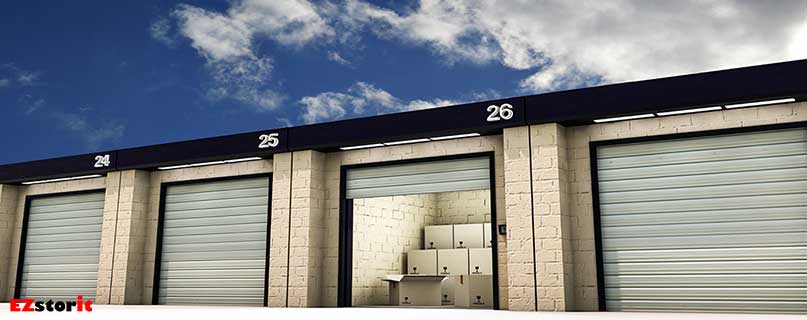Jul
13
Store Your Used and Unused Batteries The Right Way
13

There are a lot of things you have to be careful with when storing. You don't want your items to become damaged or not work correctly when you need them again. You also don't want to take the chance of certain items causing harm to other things you have stored. For example, understanding how to store used and unused batteries the right way is very important for the quality and safety of your storage unit and all the items inside it. Here's what you need to know.
Temperature and Moisture Affect Batteries
When you need to store batteries, choose a climate controlled area. This should be done because changes in moisture levels, as well as changes in temperature, can affect how well batteries work and how long of a shelf life they have. Batteries are also needed for so many things, that they're relied upon frequently. They need to work when you want or need them, and if they aren't stored right you might find that the batteries you're expecting to use don't have any life left in them, have corroded, or otherwise don't work.
For unused batteries, make sure to keep them in their original, unopened packaging. Know where they are, and keep them in good working condition by noting their expiration date and storing them where they have the best chance of being protected. If your unused batteries have already been opened, and you can't keep them in the original packaging, putting them in a plastic container also works. They should never be stored inside the equipment they're used to power, because that can lead to corrosion.
Putting batteries into a cool location that has low levels of humidity is the best choice. If you're storing them at a facility with other items, choose a climate controlled unit to help protect your batteries and other items. Also align all your stored batteries in the same direction. If possible, you should put plastic caps over the ends. That will help reduce corrosion chances, and keep any possible corrosion confined, so it doesn't spread to other batteries being stored. These caps aren't required, but they can be helpful.
Don't Store All Your Batteries Together
If you have old and new batteries, they should be kept separate from one another. Mixing them can cause higher levels of corrosion, and cause you to lose battery life faster. You may also grab older batteries when you really need new ones for the task, and that can leave whatever you're trying to do incomplete. Not only is that frustrating, but it could even be potentially dangerous, depending on what you need the batteries for. Separating them into two containers is the best way to avoid all of that, and reduce problems.
You Want the Longest Shelf Life
The goal, when you store batteries, is to keep them available and at optimum strength for as long as possible. All batteries have different shelf lives, even when you keep them under the very best conditions for storage. For unused alkaline batteries, you can expect a shelf life of between five and 10 years. If you have Ni-MH batteries, around three to five years is the expected shelf life. Lithium-ion batteries, which are the kind used in things like cell phones, have a low rate of self-discharge. These batteries may still have a partial charge for up to four years.
Batteries often have expiration dates printed on them, or on the packaging. That means the manufacturer feels confident that the battery will keep a full charge at least until that time. These estimates of battery life are also conservative, so your batteries will probably hold a charge longer than that. That's especially true if you store them in optimal conditions. Don't throw away batteries that are a little past their expiration date. It's quite likely that you can get at least some use out of them. Just be aware that they might not last as long as their non-expired counterparts.
Quick Tips to Protect Your Batteries
If you're placing batteries in storage, they probably aren't going to be used for a while. Take those batteries out of any equipment they're in, and store them separately. They'll likely last longer, and they won't damage the equipment they go in, if they do happen to corrode. Also, keep the temperature down. Batteries that are exposed to extreme heat or a lot of sunlight go bad faster. Choose a climate controlled unit, if you want your batteries to last as long as possible.
Make sure batteries are contained, and don't store them where they can come into contact with anything metal. The original packaging is best, but if that's not possible, then choose a plastic container or a battery storage box that's specifically designed for that purpose. You can also put a rubber band around the batteries, and put them into a plastic bag. Just make sure that all the positive and negative terminals are pointing the same direction when you band the batteries together.
Old and new batteries shouldn't be mixed together in devices, which means you shouldn't mix them together when you store them, either. That can cause you to put both old and new batteries into a device, which can lead to damage or battery leakage. If you accidentally get your batteries mixed up, you can use a battery tester to sort them out. If you have rechargeable batteries, though, keep them separate from other batteries and store them with a 40% charge, so they can gradually discharge over time.
Storing batteries safely doesn't have to be difficult or complicated. The more you take care to properly store your batteries, the more shelf life you'll get from them. You'll also reduce the chances of having them leak or damage other items, making them safer and protecting the things you care about. Good battery storage isn't something a lot of people think about, but it's an important part of storing items at a facility or even in your home.
By Jerilyn Alvarez
Just a Georgia Peach looking to learn how business works one job at a time and trying to make a difference to others each day! Enjoy writing about everyday experiences and connecting with others. #Marketing #Blogging #CustomerRelationships #VolunteerService is what I am about. Pursuing a degree in Business Management specializing in Customer Relations Management. As a Marketing Assistant, Jerilyn manages all social media accounts for EZstorit, outreach for SEO and contributes to blog articles.






